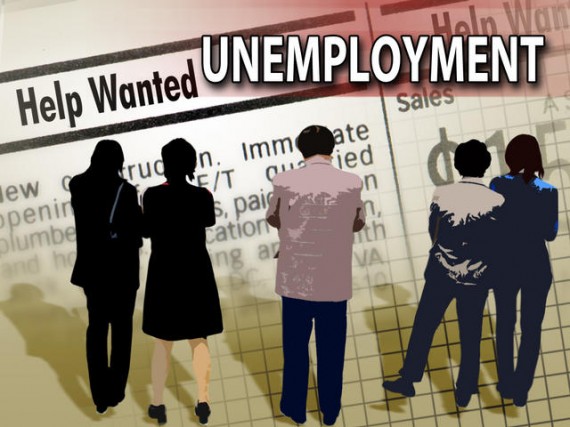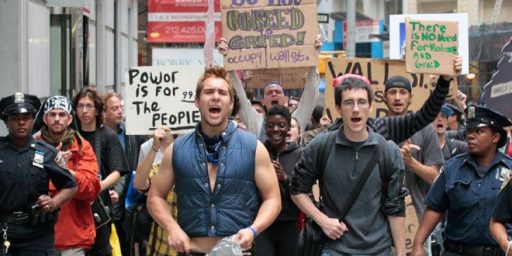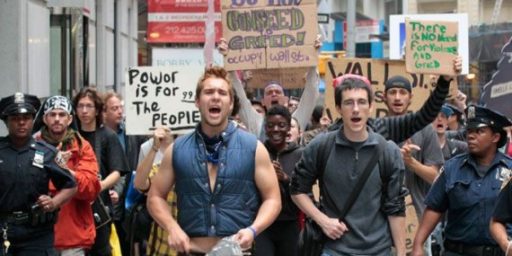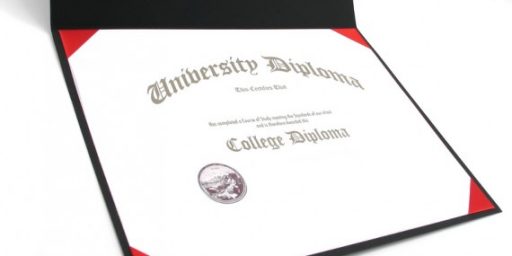Gallup: Vast Majority Of College Graduates Are Employed
One of the most prominent themes of the Occupy Wall Street protests has been the phenomenon of college graduates saddled with large student loan debt and no job. While there are no doubt anecdotal cases where this is true, and I’m not going to question the people who’ve posted those stores on the “We Are The 99%” Tumblr Page, a new Gallup survey seems to indicate that it’s not typical of college graduates:
While 64% of the U.S workforce is employed full time for an employer, as measured by Gallup from January to September 2011, this percentage ranges from a high of 73% among college graduates to a low of 29% among those aged 65 and older. An additional 7% work full time for themselves and 10% work part time and do not want full-time work, with those 65 and older by far the most likely to fit into these two categories.
That gives as a high of 89% of college graduates who are either employed full-time for an employer or themselves, or employed part-time by choice. The only group for whom this number is larger are those who have completed a post-graduate degree, 91% of whom fit into one of those three categories. In both cases, higher education clearly gives one better job opportunities than those who have not done so, despite the defeatism that one hears from the college graduates that make up the people who post their stories and have become among the more prominent voices of the “Occupy Wall Street” movement.
Alana Goodman comments:
The defeatism of the students involved in the “Occupy Wall Street” protests is out of proportion with reality. At a time when much of the country is struggling economically, college students should realize they’re the fortunate ones.
Perhaps they are, but it seems rather apparent that economic pessimism isn’t just a function of what your present position is. To some extent, one imagines that it’s also rooted in the unnerving suspicion that things are either going to get worse, or that they aren’t going to be as good in the future. In either case case, when the economy is in a bad spot like it is now telling people that they’re doing okay relatively speaking doesn’t necessarily answer the question.







Um… what’s the time frame for the Gallup poll in terms of “which college graduates?”
I’m guessing that if they did a poll based on “College Graduates since 2006”, they’d get a very different answer.
What you seem to keep ignoring, Doug, is that we’ve gone through a transformation over the last 15 years where the opportunities that were once there (and were promised to people who “played by the rules) are no longer there, and they’re NOT COMING BACK.
That’s the difference.
We have a 9 percent unemployment rate, which is extraordinarily high. But that still means the vast majority–91 percent!–have jobs. And, yes, college graduates are doing much better than non-graduates overall. But those who’ve graduated from college the last two of three years–during the current downturn–are doing much less well than those of us who graduated earlier and got into the labor force.
@EddieInCA:
I recognize that completely Eddie. I also recognize there seems to be little that can be done about it.
@Doug Mataconis:
You put up a post, which is an attempt to marginalize an argument that some of the Occupy Wall Street people are making, yet the data which you link to creates a false equivalency.
Why? What’s your point?
I graduated College in 1982. Should my employment be compared to the graduate of 2009? Let me answer that for you: No. Different worlds.
And in your words “Nothing can be done about it”. So what would you tell that college graduate who has no job prospects and he/she has done everything right. They’ve stayed out of trouble. They went to school. They got good grades. They graduated from a College or University with a degree, and yet… no job, and no job prospects.
What do you tell them?
Actually, I know what YOU’D tell them: “Tough. Shit happens. Sucks to be you.”
Ah, a post about unemployment rates and how they pertain to these so-called protests.
A few points are worth mentioning:
1. As already stated there’s a difference between measuring unemployment rates among college graduates as a whole and measuring unemployment rates among people who’ve graduated within the past 3-4 years. Not only that, but given the way in which the unemployment rate is calculated — if you’re not at all looking for work or recently have dropped your job search then you’re not counted — a more accurate and telling measure would be the U-6 unemployment rate among the younger demographic in general and among college grads in particular. Right now those stats are gruesome. That said, however, these putative protesters are nothing more than miscreants.
2. A 9% headline unemployment rate does not mean that 91% have jobs. Not even close. Again, the unemployment rate does not count people who are not at all looking for work (e.g., retirees, recent grads living with their parents and not bothering to conduct job searches), those not eligible to be working in the first instance (minors, prisoners), and those who recently have given up looking for work due to poor job prospects. The U-6 unemployment rate is a broader measure that takes into account discouraged applicants and those who only are working part time for economic reasons. The labor force participation rate and the employment population ratio both are broader measures which provide more global statements of how many of us have jobs and how many of us don’t have jobs.
3. To put some of these stats into perspective, the real unemployment picture at present (the U-6 rate) is the worst since the Great Depression.
4. Even during the height of the Great Depression about 75% of eligible job seekers gainfully were employed. That doesn’t mean, however, things weren’t truly depressed. They were. Hopefully the next generation doesn’t have to find out the hard way what massive and lasting unemployment can do to a generation. That said, I don’t like their chances.
Well, they say, the Great Depression wasn’t so bad if you had a job or didn’t need one. But we still study it as a very bad time.
Others like my Grandmother started their adult lives in the Great Depression, scraped money for food but didn’t really know it was a Depression since they were poor before it all started.
The fact is the best gaurantee of a decent life is a degree. The higher the degree the more likely.
But education costs have tripled since Reagan and the beginning of the attack on the middle-class. But Republicans want to slash funding for Pell grants. I don’t know about the rest of you but Pell grants helped me get through undergrad.
What happens when the middle class can no longer afford this path to a decent life? Are tax cuts, on top of already historically low effective rates, for the wealthy worth selling out the next generation? How much are we willing to sacrifice for the wealthy?
It’s just another example of the extremists pulling the ladder up behind them.
how many of those recent college grads are employed stocking shelves or flipping burgers?
cant pay your loan back with that kind of income..
btw, James Joyner said: “We have a 9 percent unemployment rate, which is extraordinarily high. But that still means the vast majority–91 percent!–have jobs”
the household survey only counts unemployed who have actively sought employment during the reference period; a better metric to use is employment / population ratio, which is at 58.3%…
so you at least can know what you’re talking about, here’s the technical notes on that report: http://bls.gov/news.release/empsit.tn.htm & here’s the questions used in the household survey, which produces your percentage number: http://www.bls.gov/cps/cps_htgm.htm#employed
@Doug Mataconis: “I also recognize there seems to be little that can be done about it.”
Doug, does it ever occur to you that you are exactly the sort of person from which FDR had to save capitalism?
Mike
@rjs: Right, I get that every man, woman, and child in America isn’t included as part of the employment report. Still, 91 percent of those who are are counted as “employed,” versus 9 percent unemployed.
@EddieInCA: It’s all the same to Doug when he wants to make a point. He reminds me of an old saying:
“Figures don’t lie, but liars do figure.”
@James Joyner: Please add yourself to the “figures don’t lie” comment above. I expect this kind of jazz from Doug; I expected better from you. Very sad.
“The fact is the best gaurantee of a decent life is a degree. The higher the degree the more likely.”
No, it´s not. Correlation is not causation: most people that have degrees have better motivation, intellectual curiosity and other abilities, and as Martin Nemko once said they would have better jobs even if they were locked in a closet for four years instead of going to college( http://www.martynemko.com/articles/americas-most-overrated-product-undergraduate-education_id1234).
Besides that, in the United States most people get degrees in areas like Law, Liberal Arts and Political Science, where there is no job available. Getting degrees in areas where there is no jobs is the formula to become the classical overeducated(And over indebted) loser, not to get a decent life.
Sorry, James; I disagree with Tsar Nicholas in almost everything( In fact, I think that the only good thing that the communists did was to execute the Tsar and his family), but he is right regarding the 9%. In fact, considering things like the safety net and low level of personal savings in the United States this number is pretty, but pretty high. It´s something easier to be unemployed in Latin America or in Europe.
@André Kenji de Sousa: Yeah, when Tsar N starts sounding more level headed and sensible than the author of the post…
The issue that the OWS protesters have is that they do not have the jobs that pay enough that it will allow them to live in Manhattan, be a hipster, and pay off their student loans.
In a broader sense, many of the protesters on the left are basically saying that they are college graduates with a ton of credential but that they cannot make enough money to be abe to afford to living away from poor people. As Elizabeth Warren says: Americans are doing broke try to live in the “good” neighborhoods.
@ de Sousa….
In that case fu** them. Well be a much better nation with a generation of uneducated youth. And the rich need more tax breaks. So it’s settled…we’lll abolish SS and Medicare so they have no safety net. We’ll abolish the EPA so they have no clean air or water and climate change will alter the planet enough so they are challenged to adopt how they live and eat. And we will not help them get educated. But the Koch Brothers of the world won’t have to pay taxes. Awesome!!!!
Can we stop pretending that a undergraduate college education means anything for actual job training and/or skills, and is simply a certificate saying you have money and/or a good credit history and thus are higher class?
Having recieved an undergraduate degree that prepared me for a career in which I enjoyed a great deal of success…no.
Maybe you just attended a bad school, or had crappy instructors.
@Lit3Bolt:
Can we stop pretending that a undergraduate college education means anything for actual job training and/or skills, and is simply a certificate saying you have money and/or a good credit history and thus are higher class?
No, we can’t. Have you ever needed to hire white collar workers? I’m guessing not.
“Well be a much better nation with a generation of uneducated youth. ”
It´s not about that. The United States needs a educated youth that´s educated in things that matters, like Engineering and Information Technology. The United States does not need people with dozens of degrees in areas where there is no work(And most of these people have few real knowledge: most of them can not speak a second language, for instance).
Andre…
Well…we can agree to disagree about the merits of vocational training versus learning to think.
The larger point is that it’s getting to where no one can afford an education any more…whether the cost increase is 3-fold or 5-fold…so what exactly the education, that they won’t be able to get, consists of is inconsequential.
@Hey Norm: It’s the bottom line — Republicans don’t want the masses learning to think. It’s why their favorite educational philosophies are always the ones that involve teaching by rote repetition, and why they hate liberal arts education. An educated populace is a populace that’s able to see what they’re doing when they loot the country; an ignorant populace is easily distracted by shouts of “scary brown people!” and “scary gay people.”
And then you have their useful idiots, the libertarian engineer brigade who are so filled with self-love they know that they are the only ones who deserve to live a decent life. They’re generous enough that they’re willing to accept anyone else into the elite, as long as they devote themselves to the only worthwhile pursuit in life, engineering. The rest of the masses are sheeple who deserve to be shorn by the one percent.
I don´t have anything against people studying Liberal Arts. But that´s not for everyone(At least at a college level) and people should choose Liberal Arts due to aspiration, not lack of knowledge to do anything that requires math. Or reading.
The split in opinion is interesting in itself. Some still hold to “any degree is good” because it was in their day. Some want to blame students for getting “dream degrees” because that isn’t so good today.
The poor student, who listened to the first group, is kind if in a bind. Too bad the first group doesn’t really step up for them.
I myself was down on dream degrees, but I am nonetheless sympathetic to students who listened to … what really was the establishment, even a year ago.